How to avoid falling for fake Pfizer emails
Phishing/ScamAlso Known As: Pfizer Supply phishing campaign
Get free scan and check if your device is infected.
Remove it nowTo use full-featured product, you have to purchase a license for Combo Cleaner. Seven days free trial available. Combo Cleaner is owned and operated by RCS LT, the parent company of PCRisk.com.
What is the "Pfizer Supply" scam?
Upon examination, we have determined that it is a scam involving several variants of the email and deceptive attachments. This is a phishing campaign launched by scammers with the purpose of tricking unsuspecting recipients into providing personal details and (or) making payments. Thus, recipients should not respond to any of the fake emails described in our article.
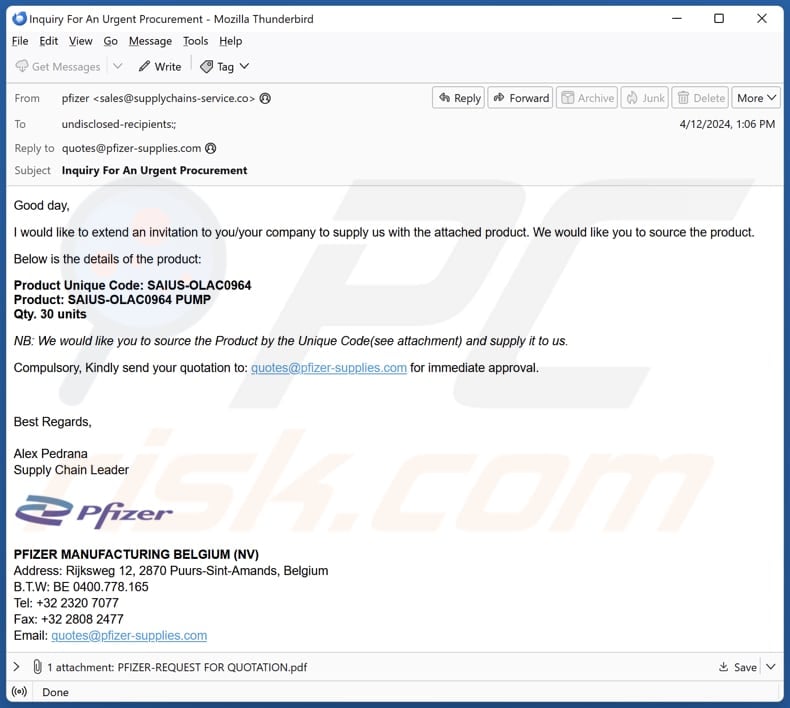
More about the "Pfizer Supply" phishing campaign
This phishing campaign follows a pattern where the scammers pretend to be a reputable company (Pfizer), instructing the recipient to provide a quotation or supply certain products. These emails provide a particular product or series of products, along with a unique code. They also contain a contact email address and an attachment.
The file attached to these emails (at least some of them) is a PDF file disguised as a request for a quotation. Additionally, these emails contain phone numbers, the supposed sender's name (and occupation), and the company's address. The attached fake documents contain a Pfizer logo and other elements to appear as legitimate requests for quotation.
Certain details within these emails and attached files vary, but their purpose is the same: to trick recipients into believing that they have received a request for quotation from the Pfizer company (a legitimate developer and producer of medicines and vaccines). In these emails, recipients are encouraged to send the received document to the provided email address.
When contacted, the scammers behind these fake emails may try to obtain sensitive information such as credit card details, ID card information, login credentials, or other details. They may also attempt to convince recipients to pay fake shipping, administration, or other fees. Overall, the ultimate goal of this phishing campaign is likely to exploit recipients for financial gain or steal sensitive information.
| Name | Pfizer Supply Email Scam |
| Threat Type | Phishing, Scam, Social Engineering, Fraud |
| Fake Claim | The attached file contains a request for quotation |
| Disguise | Letter from Pfizer |
| Symptoms | Unauthorized online purchases, changed online account passwords, identity theft, illegal access of the computer. |
| Distribution methods | Deceptive emails, rogue online pop-up ads, search engine poisoning techniques, misspelled domains. |
| Damage | Loss of sensitive private information, monetary loss, identity theft. |
| Malware Removal (Windows) |
To eliminate possible malware infections, scan your computer with legitimate antivirus software. Our security researchers recommend using Combo Cleaner. Download Combo CleanerTo use full-featured product, you have to purchase a license for Combo Cleaner. 7 days free trial available. Combo Cleaner is owned and operated by RCS LT, the parent company of PCRisk.com. |
Similar scam emails in general
Usually, phishing emails impersonate reputable companies like Pfizer and pressure recipients to act quickly. They aim to trick recipients into providing sensitive information or engaging in transactions, leading to financial loss, identity theft, or other issues. Additionally, phishing emails often contain links to deceptive pages or attachments (e.g., fake documents).
Some examples of phishing emails are: "Crédit Agricole", "Error In Your IMAP/POP3 Mails Server", and "Mailbox Update". It is important to note that links and files in such emails can be malicious.
How do spam campaigns infect computers?
When threat actors aim to deliver malware via email, they send malicious links or attachments. Opening these links or files can allow malware to infiltrate systems. This often involves tricking users into taking steps such as opening files hosted on untrustworthy pages or activating macro commands in malicious MS Office documents.
However, computers cannot get infected via email unless users open malicious files or pages. Threat actors commonly utilize malicious MS Office documents, PDFs, archives, executables, ISO files, and script files to trick users into executing malware.
How to avoid installation of malware?
Scrutinize emails before accessing any files or links, particularly those in unexpected emails from unknown sources. Avoid downloading pirated software, cracking tools, key generators, and similar programs. Rely on official websites and app stores for software and file downloads.
Do not trust advertisements, pop-ups, or buttons on suspicious websites, including notifications from such pages. Keep your operating system and installed programs up to date and employ a trusted antivirus or anti-malware tool for the security of your computer. If you have already opened malicious attachments, we recommend running a scan with Combo Cleaner Antivirus for Windows to automatically eliminate infiltrated malware.
Text presented in the "Pfizer Supply" email letter (first screenshot):
Subject: Inquiry For An Urgent Procurement
Good day,
I would like to extend an invitation to you/your company to supply us with the attached product. We would like you to source the product.
Below is the details of the product:
Product Unique Code: SAIUS-OLAC0964
Product: SAIUS-OLAC0964 PUMP
Qty. 30 unitsNB: We would like you to source the Product by the Unique Code(see attachment) and supply it to us.
Compulsory, Kindly send your quotation to: quotes@pfizer-supplies.com for immediate approval.
Best Regards,Alex Pedrana
Supply Chain LeaderPFIZER MANUFACTURING BELGIUM (NV)
Address: Rijksweg 12, 2870 Puurs-Sint-Amands, Belgium
B.T.W: BE 0400.778.165
Tel: +32 2320 7077
Fax: +32 2808 2477
Email: quotes@pfizer-supplies.com
Other examples of Pfizer supply-themed spam emails:
Sample 1:
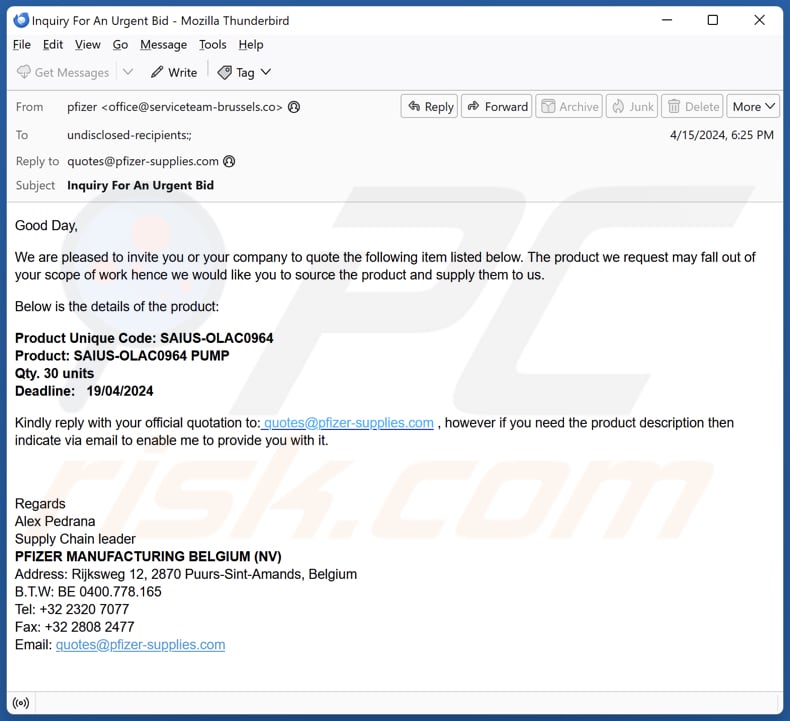
Text in this email:
Subject: Inquiry For An Urgent Bid
Good Day,
We are pleased to invite you or your company to quote the following item listed below. The product we request may fall out of your scope of work hence we would like you to source the product and supply them to us.
Below is the details of the product:
Product Unique Code: SAIUS-OLAC0964
Product: SAIUS-OLAC0964 PUMP
Qty. 30 units
Deadline: 19/04/2024Kindly reply with your official quotation to: quotes@pfizer-supplies.com , however if you need the product description then indicate via email to enable me to provide you with it.
Regards
Alex Pedrana
Supply Chain leader
PFIZER MANUFACTURING BELGIUM (NV)
Address: Rijksweg 12, 2870 Puurs-Sint-Amands, Belgium
B.T.W: BE 0400.778.165
Tel: +32 2320 7077
Fax: +32 2808 2477
Email: quotes@pfizer-supplies.com
Sample 2:
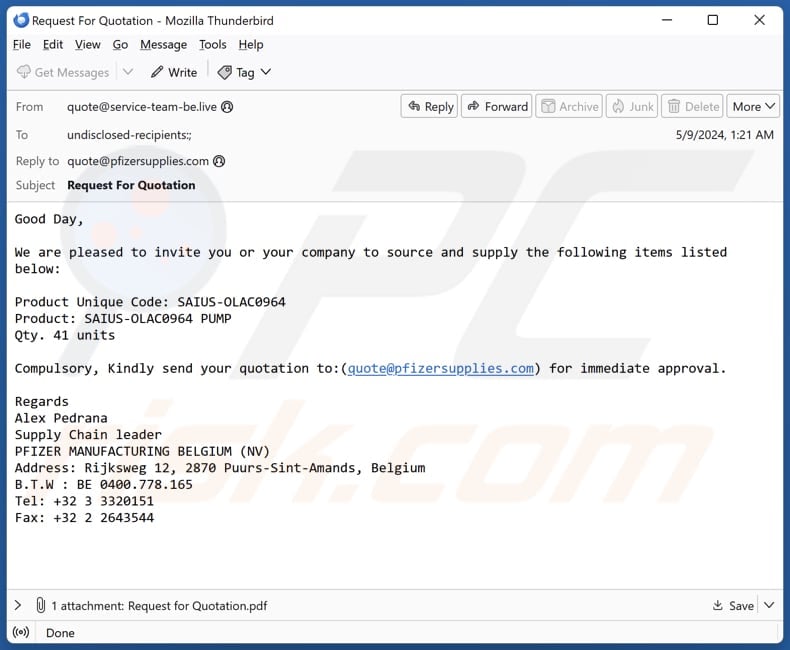
Text in this email:
Subject: Request For Quotation
Good Day,
We are pleased to invite you or your company to source and supply the following items listed below:
Product Unique Code: SAIUS-OLAC0964
Product: SAIUS-OLAC0964 PUMP
Qty. 41 unitsCompulsory, Kindly send your quotation to:(quote@pfizersupplies.com) for immediate approval.
Regards
Alex Pedrana
Supply Chain leader
PFIZER MANUFACTURING BELGIUM (NV)
Address: Rijksweg 12, 2870 Puurs-Sint-Amands, Belgium
B.T.W : BE 0400.778.165
Tel: +32 3 3320151
Fax: +32 2 2643544
The file attached to this email:
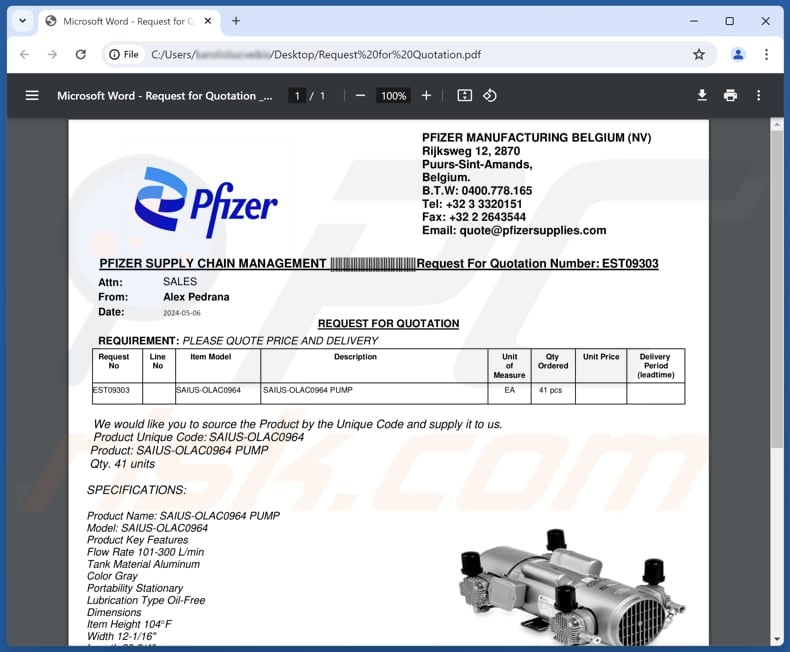
Sample 3:
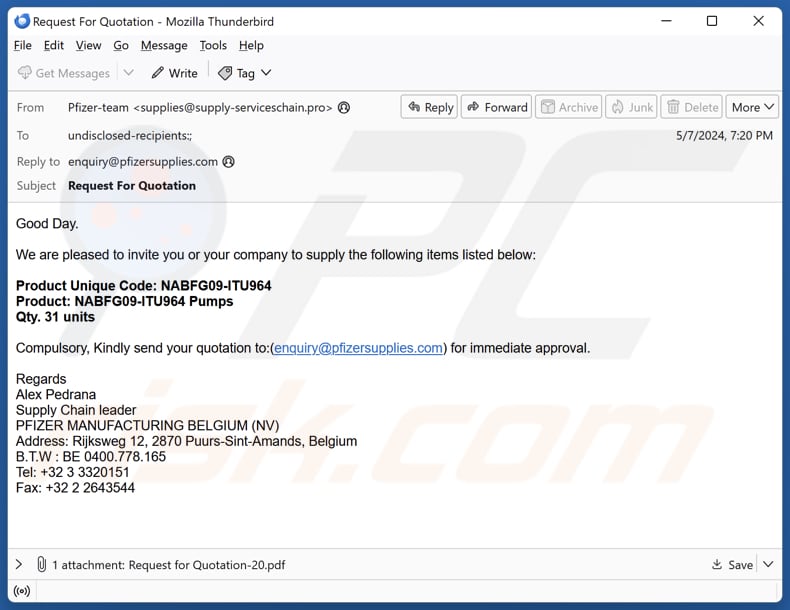
Text in this email:
Subject: Request For Quotation
Good Day.
We are pleased to invite you or your company to supply the following items listed below:
Product Unique Code: NABFG09-ITU964
Product: NABFG09-ITU964 Pumps
Qty. 31 units
Compulsory, Kindly send your quotation to:(enquiry@pfizersupplies.com) for immediate approval.Regards
Alex Pedrana
Supply Chain leader
PFIZER MANUFACTURING BELGIUM (NV)
Address: Rijksweg 12, 2870 Puurs-Sint-Amands, Belgium
B.T.W : BE 0400.778.165
Tel: +32 3 3320151
Fax: +32 2 2643544
File attached to this email:
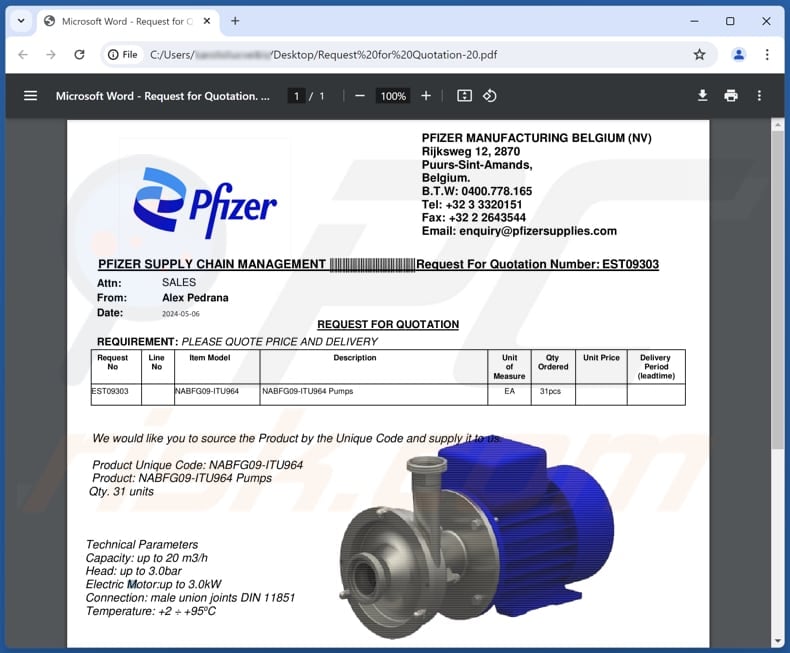
Sample 4:
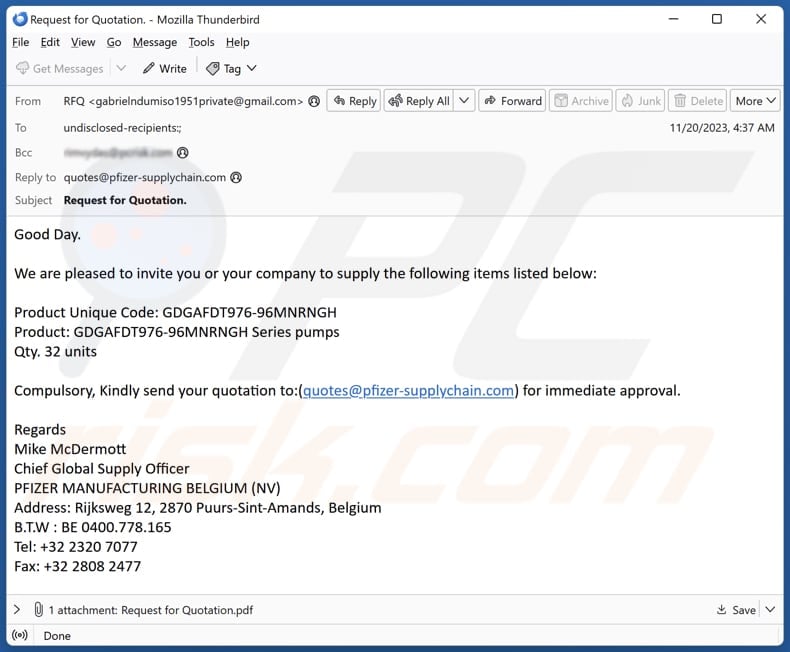
Text in this email:
Subject: Request for Quotation.
Good Day.We are pleased to invite you or your company to supply the following items listed below:
Product Unique Code: GDGAFDT976-96MNRNGH
Product: GDGAFDT976-96MNRNGH Series pumps
Qty. 32 units
Compulsory, Kindly send your quotation to:(quotes@pfizer-supplychain.com) for immediate approval.Regards
Mike McDermott
Chief Global Supply Officer
PFIZER MANUFACTURING BELGIUM (NV)
Address: Rijksweg 12, 2870 Puurs-Sint-Amands, Belgium
B.T.W : BE 0400.778.165
Tel: +32 2320 7077
Fax: +32 2808 2477
File attached to this email:
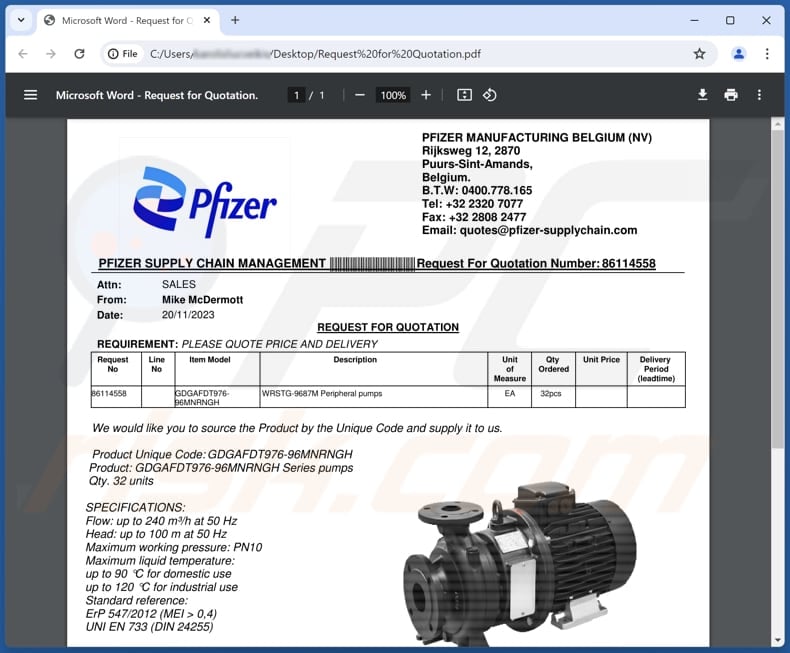
Sample 5:
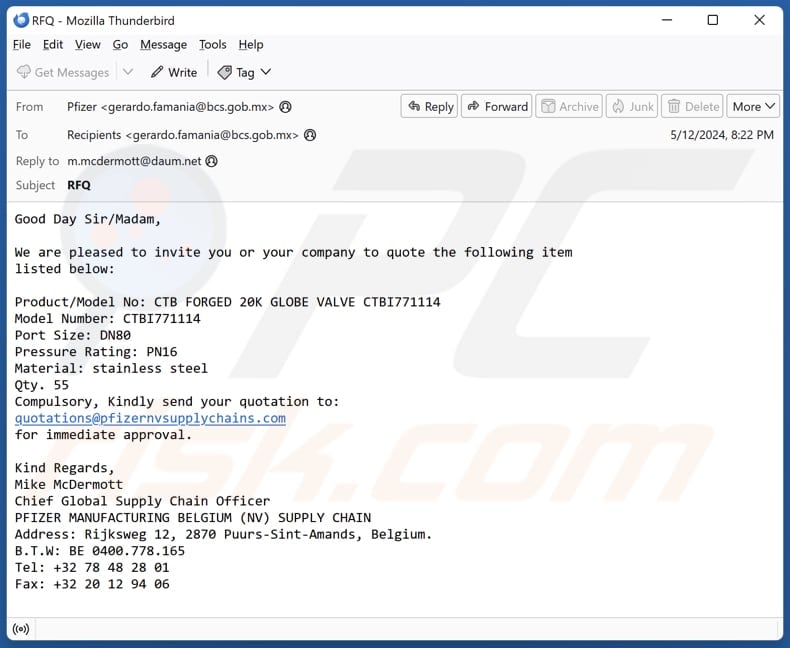
Text in this email:
Subject: RFQ
Good Day Sir/Madam,
We are pleased to invite you or your company to quote the following item
listed below:Product/Model No: CTB FORGED 20K GLOBE VALVE CTBI771114
Model Number: CTBI771114
Port Size: DN80
Pressure Rating: PN16
Material: stainless steel
Qty. 55
Compulsory, Kindly send your quotation to:
quotations@pfizernvsupplychains.com
for immediate approval.Kind Regards,
Mike McDermott
Chief Global Supply Chain Officer
PFIZER MANUFACTURING BELGIUM (NV) SUPPLY CHAIN
Address: Rijksweg 12, 2870 Puurs-Sint-Amands, Belgium.
B.T.W: BE 0400.778.165
Tel: +32 78 48 28 01
Fax: +32 20 12 94 06
Sample 6:
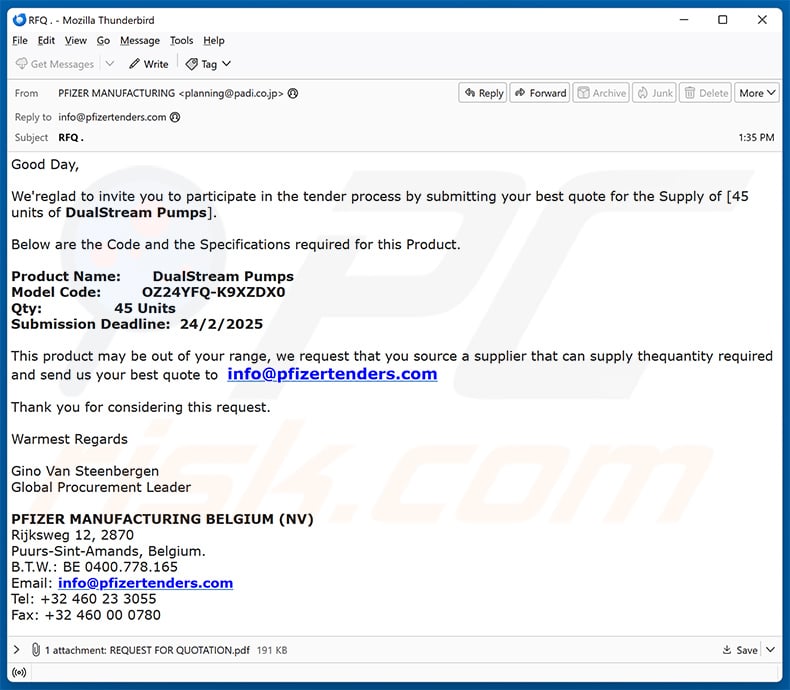
Text presented within:
Subject: RFQ .
Good Day,
We'reglad to invite you to participate in the tender process by submitting your best quote for the Supply of [45 units of DualStream Pumps].
Below are the Code and the Specifications required for this Product.
Product Name: DualStream Pumps
Model Code: OZ24YFQ-K9XZDX0
Qty: 45 Units
Submission Deadline: 24/2/2025
This product may be out of your range, we request that you source a supplier that can supply thequantity required and send us your best quote to info@pfizertenders.com
Thank you for considering this request.
Warmest Regards
Gino Van Steenbergen
Global Procurement Leader
PFIZER MANUFACTURING BELGIUM (NV)
Rijksweg 12, 2870
Puurs-Sint-Amands, Belgium.
B.T.W.: BE 0400.778.165
Email: info@pfizertenders.com
Tel: +32 460 23 3055
Fax: +32 460 00 0780
Sample 7:
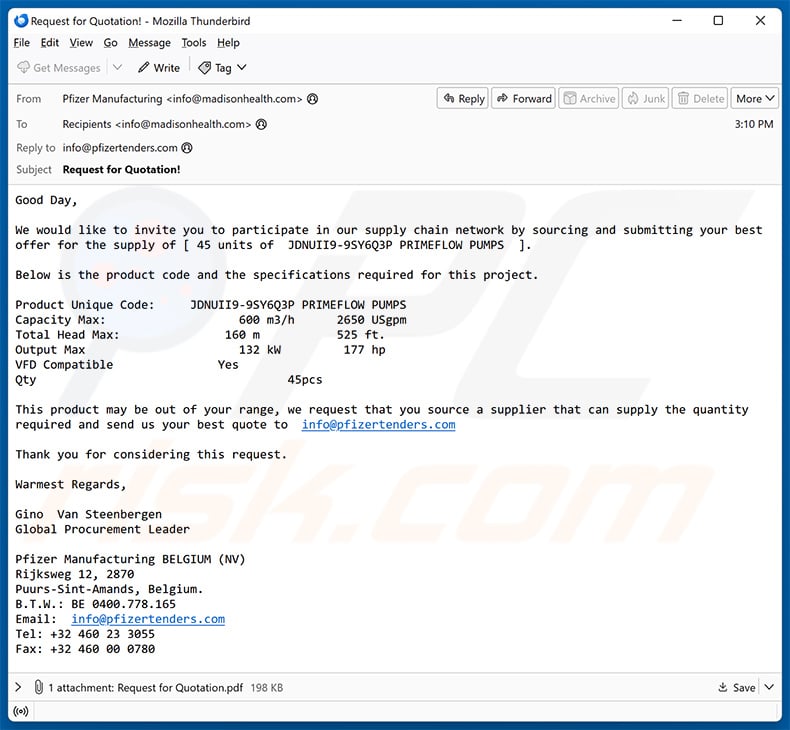
Text presented within:
Subject: Request for Quotation!
Good Day,
We would like to invite you to participate in our supply chain network by sourcing and submitting your best offer for the supply of [ 45 units of JDNUII9-9SY6Q3P PRIMEFLOW PUMPS ].
Below is the product code and the specifications required for this project.
Product Unique Code: JDNUII9-9SY6Q3P PRIMEFLOW PUMPS
Capacity Max: 600 m3/h 2650 USgpm
Total Head Max: 160 m 525 ft.
Output Max 132 kW 177 hp
VFD Compatible Yes
Qty 45pcsThis product may be out of your range, we request that you source a supplier that can supply the quantity required and send us your best quote to info@pfizertenders.com
Thank you for considering this request.
Warmest Regards,
Gino Van Steenbergen
Global Procurement LeaderPfizer Manufacturing BELGIUM (NV)
Rijksweg 12, 2870
Puurs-Sint-Amands, Belgium.
B.T.W.: BE 0400.778.165
Email: info@pfizertenders.com
Tel: +32 460 23 3055
Fax: +32 460 00 0780
Sample 8:
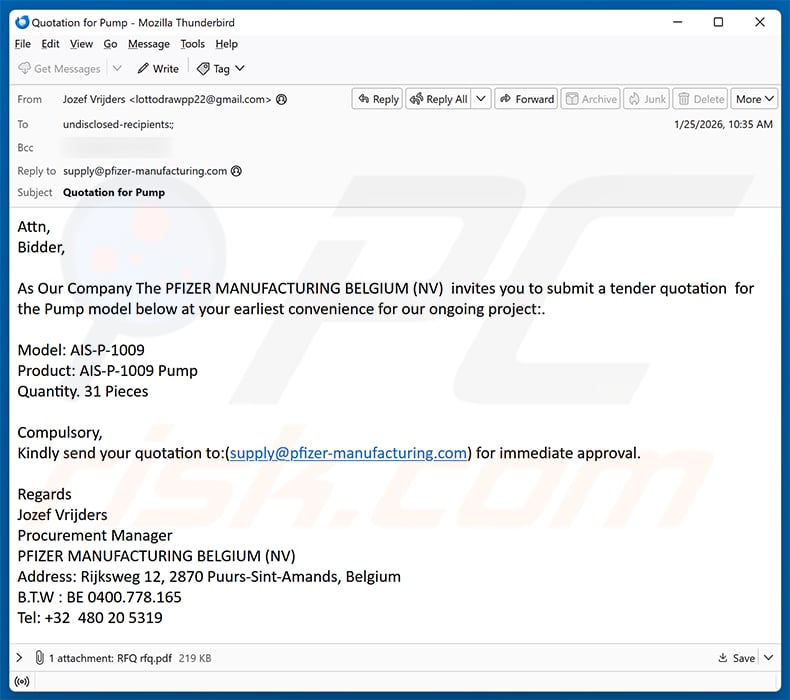
Text presented within:
Subject: Quotation for Pump
Attn,
Bidder,As Our Company The PFIZER MANUFACTURING BELGIUM (NV) invites you to submit a tender quotation for the Pump model below at your earliest convenience for our ongoing project:.
Model: AIS-P-1009
Product: AIS-P-1009 Pump
Quantity. 31 PiecesCompulsory,
Kindly send your quotation to:(supply@pfizer-manufacturing.com) for immediate approval.Regards
Jozef Vrijders
Procurement Manager
PFIZER MANUFACTURING BELGIUM (NV)
Address: Rijksweg 12, 2870 Puurs-Sint-Amands, Belgium
B.T.W : BE 0400.778.165
Tel: +32 480 20 5319
Sample 9:
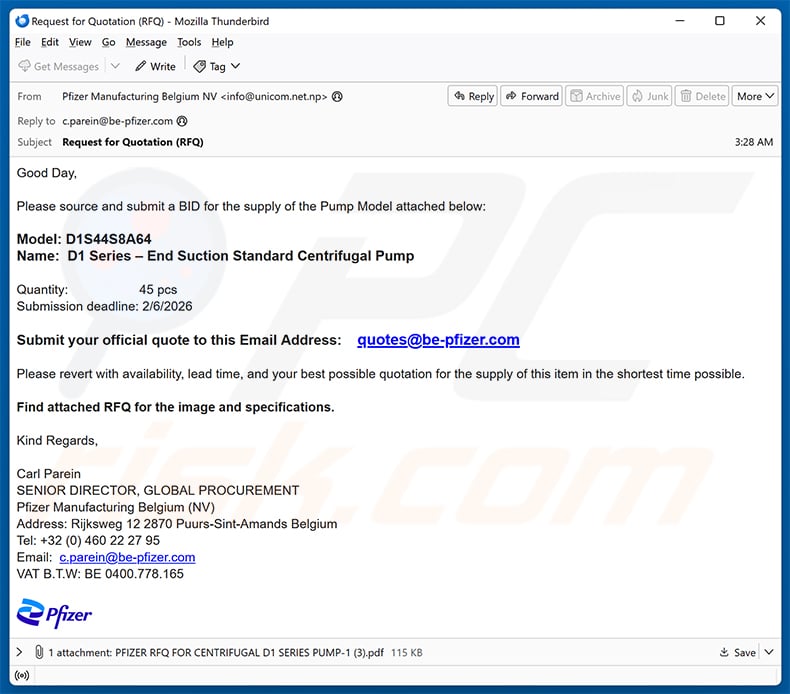
Text presented within:
Subject: Request for Quotation (RFQ)
Good Day,
Please source and submit a BID for the supply of the Pump Model attached below:
Model: D1S44S8A64
Name: D1 Series – End Suction Standard Centrifugal Pump
Quantity: 45 pcs
Submission deadline: 2/6/2026
Submit your official quote to this Email Address: quotes@be-pfizer.com
Please revert with availability, lead time, and your best possible quotation for the supply of this item in the shortest time possible.
Find attached RFQ for the image and specifications.
Kind Regards,
Carl Parein
SENIOR DIRECTOR, GLOBAL PROCUREMENT
Pfizer Manufacturing Belgium (NV)
Address: Rijksweg 12 2870 Puurs-Sint-Amands Belgium
Tel: +32 (0) 460 22 27 95
Email: c.parein@be-pfizer.com
VAT B.T.W: BE 0400.778.165
Instant automatic malware removal:
Manual threat removal might be a lengthy and complicated process that requires advanced IT skills. Combo Cleaner is a professional automatic malware removal tool that is recommended to get rid of malware. Download it by clicking the button below:
DOWNLOAD Combo CleanerBy downloading any software listed on this website you agree to our Privacy Policy and Terms of Use. To use full-featured product, you have to purchase a license for Combo Cleaner. 7 days free trial available. Combo Cleaner is owned and operated by RCS LT, the parent company of PCRisk.com.
Quick menu:
- What is Pfizer Supply phishing campaign?
- Types of malicious emails.
- How to spot a malicious email?
- What to do if you fell for an email scam?
Types of malicious emails:
![]() Phishing Emails
Phishing Emails
Most commonly, cybercriminals use deceptive emails to trick Internet users into giving away their sensitive private information, for example, login information for various online services, email accounts, or online banking information.
Such attacks are called phishing. In a phishing attack, cybercriminals usually send an email message with some popular service logo (for example, Microsoft, DHL, Amazon, Netflix), create urgency (wrong shipping address, expired password, etc.), and place a link which they hope their potential victims will click on.
After clicking the link presented in such email message, victims are redirected to a fake website that looks identical or extremely similar to the original one. Victims are then asked to enter their password, credit card details, or some other information that gets stolen by cybercriminals.
![]() Emails with Malicious Attachments
Emails with Malicious Attachments
Another popular attack vector is email spam with malicious attachments that infect users' computers with malware. Malicious attachments usually carry trojans that are capable of stealing passwords, banking information, and other sensitive information.
In such attacks, cybercriminals' main goal is to trick their potential victims into opening an infected email attachment. To achieve this goal, email messages usually talk about recently received invoices, faxes, or voice messages.
If a potential victim falls for the lure and opens the attachment, their computers get infected, and cybercriminals can collect a lot of sensitive information.
While it's a more complicated method to steal personal information (spam filters and antivirus programs usually detect such attempts), if successful, cybercriminals can get a much wider array of data and can collect information for a long period of time.
![]() Sextortion Emails
Sextortion Emails
This is a type of phishing. In this case, users receive an email claiming that a cybercriminal could access the webcam of the potential victim and has a video recording of one's masturbation.
To get rid of the video, victims are asked to pay a ransom (usually using Bitcoin or another cryptocurrency). Nevertheless, all of these claims are false - users who receive such emails should ignore and delete them.
How to spot a malicious email?
While cyber criminals try to make their lure emails look trustworthy, here are some things that you should look for when trying to spot a phishing email:
- Check the sender's ("from") email address: Hover your mouse over the "from" address and check if it's legitimate. For example, if you received an email from Microsoft, be sure to check if the email address is @microsoft.com and not something suspicious like @m1crosoft.com, @microsfot.com, @account-security-noreply.com, etc.
- Check for generic greetings: If the greeting in the email is "Dear user", "Dear @youremail.com", "Dear valued customer", this should raise suspiciousness. Most commonly, companies call you by your name. Lack of this information could signal a phishing attempt.
- Check the links in the email: Hover your mouse over the link presented in the email, if the link that appears seems suspicious, don't click it. For example, if you received an email from Microsoft and the link in the email shows that it will go to firebasestorage.googleapis.com/v0... you shouldn't trust it. It's best not to click any links in the emails but to visit the company website that sent you the email in the first place.
- Don't blindly trust email attachments: Most commonly, legitimate companies will ask you to log in to their website and to view any documents there; if you received an email with an attachment, it's a good idea to scan it with an antivirus application. Infected email attachments are a common attack vector used by cybercriminals.
To minimise the risk of opening phishing and malicious emails we recommend using Combo Cleaner Antivirus for Windows.
Example of a spam email:

What to do if you fell for an email scam?
- If you clicked on a link in a phishing email and entered your password - be sure to change your password as soon as possible. Usually, cybercriminals collect stolen credentials and then sell them to other groups that use them for malicious purposes. If you change your password in a timely manner, there's a chance that criminals won't have enough time to do any damage.
- If you entered your credit card information - contact your bank as soon as possible and explain the situation. There's a good chance that you will need to cancel your compromised credit card and get a new one.
- If you see any signs of identity theft - you should immediately contact the Federal Trade Commission. This institution will collect information about your situation and create a personal recovery plan.
- If you opened a malicious attachment - your computer is probably infected, you should scan it with a reputable antivirus application. For this purpose, we recommend using Combo Cleaner Antivirus for Windows.
- Help other Internet users - report phishing emails to Anti-Phishing Working Group, FBI’s Internet Crime Complaint Center, National Fraud Information Center and U.S. Department of Justice.
Frequently Asked Questions (FAQ)
Why did I receive this email?
Typically, scammers acquire email addresses from data breaches, public directories, or the dark web. They send identical emails to all recipients, lacking personalized information (e.g., names or surnames).
I have provided my personal information when tricked by this email, what should I do?
Change the passwords for any accounts that might have been accessed by scammers. Moreover, notify the relevant authorities, such as your email provider, bank, or law enforcement, about the phishing attempt.
I have downloaded and opened a malicious file attached to an email, is my computer infected?
The likelihood of malware infiltration depends on the file type. If it was an executable file, the risk is high. However, with document files like PDFs or Word documents, there is a chance you may have avoided malware infiltration. Files attached to the emails described in our article are not malicious.
I have read the email but did not open the attachment, is my computer infected?
Reading emails typically poses no harm. Malware cannot infiltrate systems without the recipient opening malicious attachments or links.
Will Combo Cleaner remove malware infections that were present in email attachment?
Combo Cleaner has the ability to find and eliminate almost all recognized malware infections. However, it is crucial to understand that advanced malware can hide deeply within your system. Therefore, conducting a comprehensive system scan is necessary to ensure thorough detection and removal.
Share:

Tomas Meskauskas
Expert security researcher, professional malware analyst
I am passionate about computer security and technology. I have an experience of over 10 years working in various companies related to computer technical issue solving and Internet security. I have been working as an author and editor for pcrisk.com since 2010. Follow me on Twitter and LinkedIn to stay informed about the latest online security threats.
PCrisk security portal is brought by a company RCS LT.
Joined forces of security researchers help educate computer users about the latest online security threats. More information about the company RCS LT.
Our malware removal guides are free. However, if you want to support us you can send us a donation.
DonatePCrisk security portal is brought by a company RCS LT.
Joined forces of security researchers help educate computer users about the latest online security threats. More information about the company RCS LT.
Our malware removal guides are free. However, if you want to support us you can send us a donation.
Donate
▼ Show Discussion